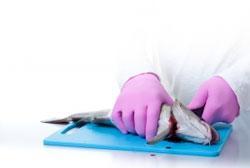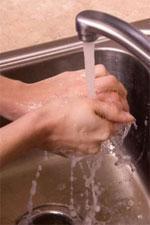This January saw a new law come into effect in the state of California requiring all chefs to wear single-use disposable gloves when preparing ready-to-eat meals.
Restaurants and food companies will have six months to implement the change.
And it doesn’t simply affect chefs – bartenders, too, have to wear gloves to prepare drinks, as they cannot touch ice, fruit garnishes, or anything else that goes in the glass.
Should all chefs have to wear gloves when preparing food?
How would we feel if these changes were implemented in the UK?
In the UK current regulations stipulate that it’s not a requirement to wear gloves when preparing food. However, gloves may be worn provided they are kept clean and are changed regularly after handling raw foods.
It’s a requirement that all food handlers maintain excellent standards of personal hygiene, which means they’re expected to wash their hands frequently. They should always wear gloves if they have a cut or sore on their hands.
Advantages of Wearing Gloves
One pro is that gloves act as a barrier for germs so they prevent the spread of food poisoning pathogens, and various strains of cold and flu viruses, making them essential in preventing food poisoning outbreaks. They also protect food from being contaminated by dirty fingernails, or from rings dropping off, for instance.

Chefs wearing gloves also contributes to a positive customer perception regarding the cleanliness of an establishment or business.
Disadvantages of Wearing Gloves

Gloves must be changed on a regular basis, as the warm, moist conditions can promote the multiplication of bacteria and act as a breeding ground for germs.
Gloves cause an additional hazard, as they can be punctured or torn, causing small pieces of glove to fall unseen into food.
Finally, a food handler who’s using gloves properly will use lots of disposable gloves, which is a waste of valuable resources and can slow down food preparation.
The Customer Viewpoint
It’s believed that customers are likely to feel more confident if their food is prepared by somebody wearing gloves. However, customer reaction to the new law has been generally negative, with customers commenting:
“This is Nanny-Stateism at its worst!” and, “This is large scale, blind regulation based on pandering to fear, not fact.”
In addition, many commented on the irony of LA banning the use of plastic bags for environmental reasons, only to introduce single-use disposable gloves for food preparation.
Whether or not a food handler wears gloves when preparing food, it’s of paramount importance that they follow proper food safety regulations, and either wash their hands regularly or change gloves frequently, ensuring they wash their hands properly with each change.
How do you feel about these changes?
Chef’s, bartenders, restaurateurs, diners – we would like to know your thoughts.
